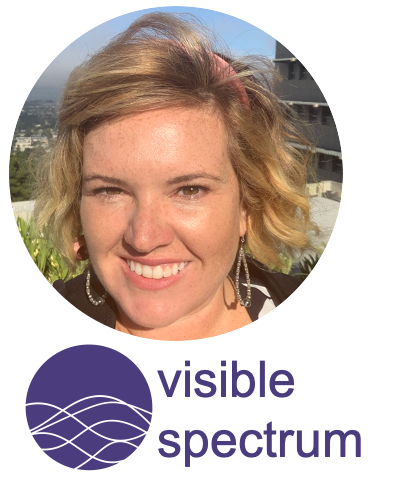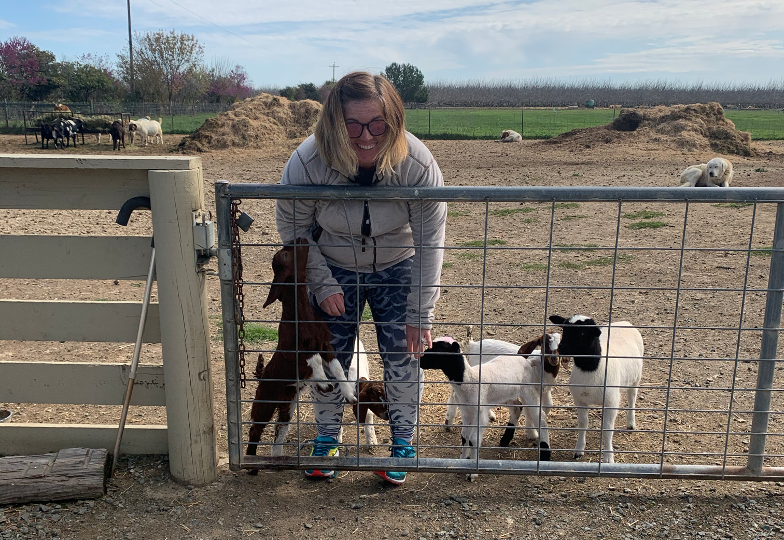 Visible Spectrum is a profile series to recognize and honor talented and dedicated women employees across Lawrence Berkeley National Lab. Mekena Metcalf is a postdoctoral fellow in Computing Sciences here at Berkeley Lab. Drawn to the Lab’s open science culture, Mekena’s research primarily focuses on developing quantum algorithms to simulate quantum mechanical systems on quantum computers.
Visible Spectrum is a profile series to recognize and honor talented and dedicated women employees across Lawrence Berkeley National Lab. Mekena Metcalf is a postdoctoral fellow in Computing Sciences here at Berkeley Lab. Drawn to the Lab’s open science culture, Mekena’s research primarily focuses on developing quantum algorithms to simulate quantum mechanical systems on quantum computers.
Outside of work, Mekena is passionate about animal husbandry, a skill which she learned from her parents. You can find her riding horses or rounding up cattle in the California foothills. Sometimes, she even helps shepherd goats in the Oakland parks and trains border collies!
What inspired you to work at Berkeley Lab?
Ever since I was an undergraduate physics student at Saint Mary’s in Moraga, I have always wanted to work in a collaborative environment at a national laboratory on big science problems. Scientific researchers can have a large-scale impact on human civilization’s progress, and I dreamed that my work could one day have such an impact.
I was drawn to the Lab in particular because of the culture of open science that encourages seamless collaboration with international researchers. Here, I am free to exchange ideas and develop professional relationships with scientists and engineers from diverse backgrounds. I truly feel that I am thriving at Berkeley Lab.
What does your current scientific project or research entail?
As a postdoc, my research falls under the quantum information technology umbrella. I primarily focus on developing quantum algorithms to simulate quantum mechanical systems on quantum computers. The difficulty with modeling quantum systems on classical devices is the exponential scaling of the state space as the system size grows. A dominant application of quantum computers is to simulate quantum physics, but this is difficult with current, noisy quantum hardware which has short lifetimes. We design methods robust to this noise and reduce resource needs so we can model chemical and material systems with quantum computers.
Additionally, my team will be identifying how artificial intelligence can be used to improve quantum network technology with the intent of bridging the gap between theory and experiment to make more efficient devices.
What excites you about your work at the Lab?
Being a part of a new scientific initiative and working with awesome scientists excites me the most. I enjoy meeting with researchers, discussing new areas for cross-collaboration, and acting on these ideas to generate new knowledge. Prior to Berkeley Lab, I was isolated as a theorist in quantum technology, but now I am part of an active community where my work is valued.
What have you been most proud of in your work?
Hands down, I am most proud of being able to mentor undergraduate researchers. Guiding them to succeed at implementing and understanding computational methods for modeling quantum systems is so fulfilling. Through these experiences, I have learned to give directions, communicate science effectively, and impart wisdom on how to become a scientist. I’m most proud of this aspect because I have witnessed substantial growth in myself as well through mentoring and leading.
Do you have tips you’d recommend for someone looking to enter and/or succeed in your field of work?
Don’t be afraid to send an email and talk to a scientist doing something that interests you. There may be opportunities to collaborate! A lot of our work is built on intuition for the mechanics, which comes with experience.
How can our community engage more women, girls, and other underrepresented groups in STEM?
Many engagement efforts I have participated in are centered around activity-based STEM workshops like Expanding Your Horizons. Most importantly, we need to remove the barrier to entry that has been substantiated by years of systemic imbalance. And having a culture that imparts a positive and inclusive experience is key.
I’ve tried to make an impact by directly mentoring female undergraduates in research projects. Mentorship when I was a young scientist considerably reinforced my decision to stay in the theoretical physics pipeline. We have to abolish the fear by supporting young scientists.
